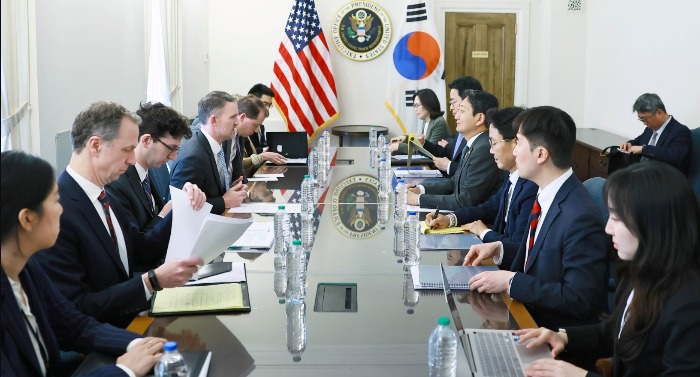South Korea asks US for tailored approach to chip tariffs
The US administration is investigating the impact of semiconductor technology imports on national security
By May 07, 2025 (Gmt+09:00)
When in S. Korea, it’s a ritual: Foreigners make stops at CU, GS25, 7-Eleven


Maybe Happy Ending: A robot love story that rewrote Broadway playbook


NPS yet to schedule external manager selection; PE firms’ fundraising woes deepen


Samsung steps up AR race with advanced microdisplay for smart glasses


Seoul appeal: Korean art captivates Indonesia’s affluent connoisseurs



South Korea has officially requested that the US take a distinct approach in its ongoing probe into foreign semiconductor technology and related downstream products, the country’s trade ministry announced on Wednesday.
Korea’s Ministry of Trade, Industry and Energy said it submitted its official written opinion on Tuesday to the US administration in response to the US Commerce Department’s national security investigation into imports of semiconductor technology.
In April, Washington launched a broad investigation into semiconductor-related imports, including chip components like silicon wafers and chipmaking equipment, as well as downstream products containing semiconductors. The probe falls under Section 232 of the US Trade Expansion Act of 1962, which permits the imposition of tariffs on imports deemed a threat to its national security.
As part of the probe, the US Commerce Department is evaluating the “feasibility of increasing domestic semiconductors capacity” in order to reduce reliance on imports and determine whether additional trade measures, including tariffs, are “necessary to protect national security,” according to a Federal Register notice posted online last month.
The Commerce Department is accepting public comments on the matter.
In its written submission, the Korean trade ministry stressed “the limited national security risk" posed by Korean-made semiconductors and chip-making equipment.
As home to the world’s top two memory chip makers — Samsung Electronics Co. and SK Hynix Inc. — Asia's No. 4 economy argued its chip exports do not negatively impact US national security or its semiconductor supply chains.
In view of this, the ministry urged the US to apply a tailored approach to Korean chip technology and related equipment as it considers trade restrictions. The outcome of the probe could result in US sector-specific tariffs on imported semiconductor products.

While emphasizing the existing balance in semiconductor and chip-making equipment trade between the two countries, Seoul raised concerns in the letter that Washington’s additional trade measures on chip tech imports could have adverse effects on both US investment in its artificial intelligence infrastructure and planned US-based investments by Korean semiconductor firms.
TARIFF-LIBERATION PACKAGE
Apart from the Section 232 probe, the two allies launched formal bilateral negotiations on broader tariff reductions in late April.
At their first meeting, they agreed to pursue what was dubbed the “July Package” — a road map to dismantle both reciprocal and sector-specific tariffs, with a focus on automobiles, semiconductors, shipbuilding and liquefied natural gas (LNG).
Since the meeting, however, Choi Sang-mok, one of the key meeting participants, abruptly resigned from Korea’s finance minister position due to a domestic political issue, spurring concerns over the continuity of the two countries’ tariff talks.
“The government will continue close consultations with the US at all levels to limit any negative impact on Korean companies as much as possible,” the trade ministry said on Wednesday in regard to the US investigation of chip imports.
“We will also maintain close communication with industry stakeholders and come up with countermeasures, while strengthening joint public-private outreach efforts within the US.”
Write to Sookyung Seo at skseo@hankyung.com
Joel Levin edited this article.
-
 AutomobilesUS auto parts tariffs take effect; Korea avoids heavy hit
AutomobilesUS auto parts tariffs take effect; Korea avoids heavy hitMay 04, 2025 (Gmt+09:00)
3 Min read -
 Business & PoliticsSeoul, Washington agree on July tariff deal framework in '2+2' trade talks
Business & PoliticsSeoul, Washington agree on July tariff deal framework in '2+2' trade talksApr 25, 2025 (Gmt+09:00)
4 Min read -
 Korean stock marketSouth Korean stocks, currency dive amid deeper US tariff turmoil
Korean stock marketSouth Korean stocks, currency dive amid deeper US tariff turmoilApr 07, 2025 (Gmt+09:00)
3 Min read -
 EntertainmentKorean entertainment stocks advance, unfazed by US tariff concerns
EntertainmentKorean entertainment stocks advance, unfazed by US tariff concernsApr 04, 2025 (Gmt+09:00)
2 Min read -



